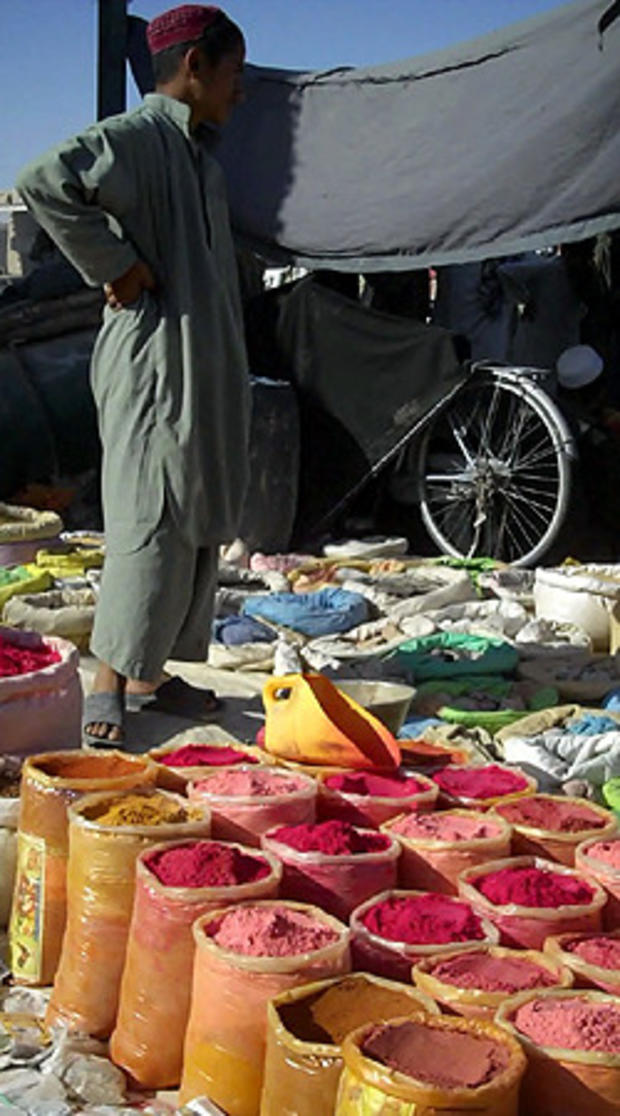Concrete Results for Marines in Safar Bazaar
As part of our continuing coverage of "Afghanistan: the Road Ahead," - CBS News correspondent Terry McCarthy follows the Third Battalion, First Marines at home, and abroad in Afghanistan.
SAFAR BAZAAR, Afghanistan.
The Marines captured Safar Bazaar (at left) in southern Helmand from the Taliban in two days at the beginning of August. Then began the long process of clearing the area of IEDs (improvised explosive devices.) It was a painstaking process that involved many weeks of probing in the dirt on roads and pathways, under trees and in the walls and doorways of buildings. The majority of the locals were delighted the Taliban had been driven out, as they ruled the population by fear, restricting their movements severely. But they were unable to help the Marines to find many of the IEDs in the market area - even if many would have liked to help.
When the Taliban were in control of the town they maintained a curfew - after 7 pm, nobody was allowed in the market area. That was when the Taliban planted their IEDs, under cover of darkness. Because of the curfew most of the locals didn't know where the IEDs had been planted. The IEDs were buried but not connected to a power source - to avoid blowing up the locals. But as soon as the Taliban saw the Marines coming through the desert to attack the town, they turned on the devices. Then most of them fled, generally towards the Pakistan border.
The Marines moved slowly and methodically, clearing the town block by block. They found 100 devices, and 16 more blew up during the search process. Two Marines were killed - Corporal Daniel Greer, an engineer, and Gunnery Sergeant Floyd Holley, an Explosives Ordinance Disposal expert. Three more were seriously wounded, requiring evacuation, and another handful "had their bell rung" - minor injuries and some concussion - from being close to an explosion.
The thickest concentration of IEDs was along the main street of the bazaar - they found 40 bombs in that street alone. But when the street was finally declared clear, the local traders came flooding back to open their stores and start business again, free of the taxes and restrictions the Taliban imposed on them. On the main market day, which is Tuesday in Safar, there are some 3,000 people crowding the streets. They come from the provincial capital, Lahskar Gah, from smaller villages in the south of the province, from the Pakistan border to the south - and a few even come from Iran, further to the south-west.
Today we walked the streets and business was lively - lamb and beef carcasses hung from butchers' hooks, while piles of pomegranates and apples and potatoes and tomatoes and eggplants lay on the ground. There were rolls of fabric and colorful skullcaps and soaps and knives and colorful spices and children's toys - we even saw a pile of SpongeBob SquarePants boots for kids.
The shop-owners all contribute a small sum of money every day to the water truck driver, who fills up his tanker from the nearby river and then sprinkles water on the dirt streets to keep the dust down. Then they decided to build a public bath at one end of the market - which required digging a trench along the middle of Main Street to bury a drainage pipe. Nobody thought to tell the Marines in advance - who, on seeing men digging holes in a street they had just cleared of IEDs, rushed out from their base ready to detain everyone in sight - or worse - until the bath project was explained to them.
Clearing Safar Bazaar was the single most important objective for 3/1 Battalion's entire 7 month deployment - not only was it a command center for the Taliban in the Garmsir district of southern Helmand, but it also functioned as a transit point for the smuggling of weapons and IEDs further north to Taliban fighters in Marjah and other areas. Since Safar fell, Taliban attacks in Marjah have gone down by 25%. As the Marines of 3/1 prepare to return home to California in a few weeks, they mourn their fellow Marines who died here, but at the same time they can see with considerable satisfaction the concrete results of what they fought for - an increased area of security for the local population, burgeoning local commerce, and a vastly diminished Taliban presence. Few of these Marines have had time to follow the news of what is happening in the rest of Afghanistan, much less to judge on the success or failure of the U.S.-led war as a whole. But here, in this chunk of land along the Helmand River, they have no doubt who is winning this war, and who is losing. For the Marines of 3/1, that is a good feeling.
More of Terry McCarthy's "Thundering Third" Blogs:
Marines Help Afghan Kids Go to School
The Most Dangerous Job in Afghanistan
In Afghanistan, a Beautiful Desert Goes Boom
